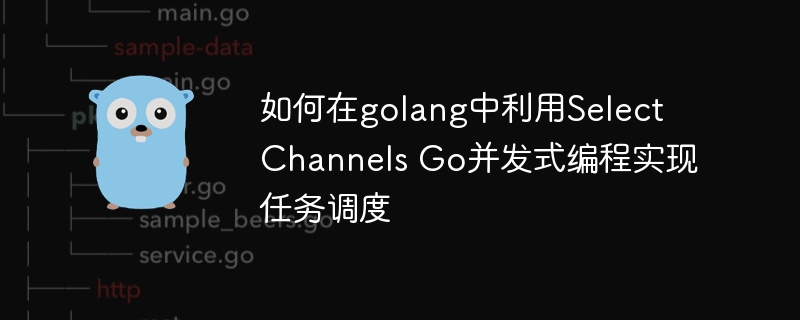

How to use Select Channels Go concurrent programming to implement task scheduling in golang
In concurrent programming, task scheduling is an important issue. In the Go language, efficient task scheduling can be achieved by using goroutine and channel. This article will introduce how to use Select Channels Go (SCG for short) to implement task scheduling and provide specific code examples.
1. What is Select Channels Go (SCG)?
SCG is a concurrent programming model based on goroutine and channel, which realizes communication and scheduling between multiple goroutines by selecting channels. It can be used to solve dependencies between multiple tasks and synchronization problems between tasks.
2. Implementation ideas of task scheduling
In SCG, we can use a channel to receive tasks, and then use the select statement to select the goroutine to execute the task. The specific implementation ideas are as follows:
3. Code Example
The following is a simple example code that implements a basic task scheduler.
package main
import (
"fmt"
"time"
)
type Task struct {
ID int
Duration time.Duration
}
func worker(id int, tasks chan Task, results chan int) {
for task := range tasks {
fmt.Printf("Worker %d is processing Task %d
", id, task.ID)
time.Sleep(task.Duration)
results <- task.ID
}
}
func scheduler(tasks []Task) {
numWorkers := 3
taskChan := make(chan Task)
resultChan := make(chan int)
for i := 0; i < numWorkers; i++ {
go worker(i, taskChan, resultChan)
}
// 将任务发送到任务通道
for _, task := range tasks {
taskChan <- task
}
close(taskChan)
// 监听结果通道,输出执行结果
for i := 0; i < len(tasks); i++ {
result := <-resultChan
fmt.Printf("Task %d is completed
", result)
}
}
func main() {
tasks := []Task{
{ID: 1, Duration: 1 * time.Second},
{ID: 2, Duration: 2 * time.Second},
{ID: 3, Duration: 3 * time.Second},
{ID: 4, Duration: 4 * time.Second},
}
scheduler(tasks)
}In the above code, we define a Task structure that contains the ID and duration of the task. The worker function represents the goroutine that executes the task. It receives the task from the task channel and sends the task ID to the result channel after a certain time. The scheduler function is responsible for creating multiple workers, sending tasks to the task channel, and monitoring the result channel to output execution results.
Run the above code, you can see that each task is executed by different goroutines, and the execution status and execution results of the task are output.
4. Summary
By using Select Channels Go mode, we can achieve task scheduling well. It makes full use of the concurrency features of goroutine and channel to provide a simple and efficient programming method.
The above is an introduction and code example on how to use Select Channels Go concurrent programming to implement task scheduling in golang. Hope this helps!
The above is the detailed content of How to use Select Channels Go concurrent programming to implement task scheduling in golang. For more information, please follow other related articles on the PHP Chinese website!




